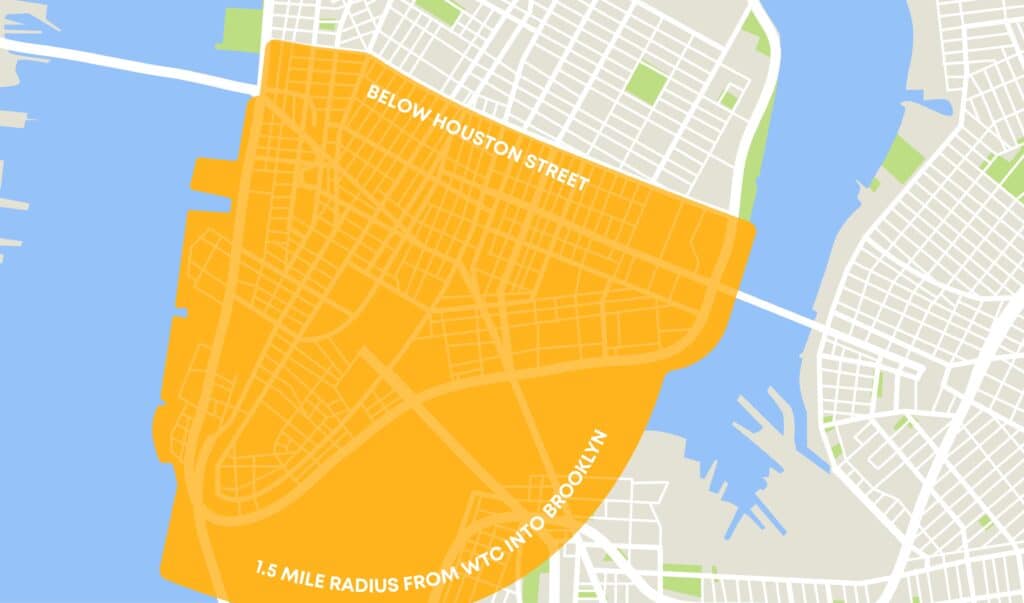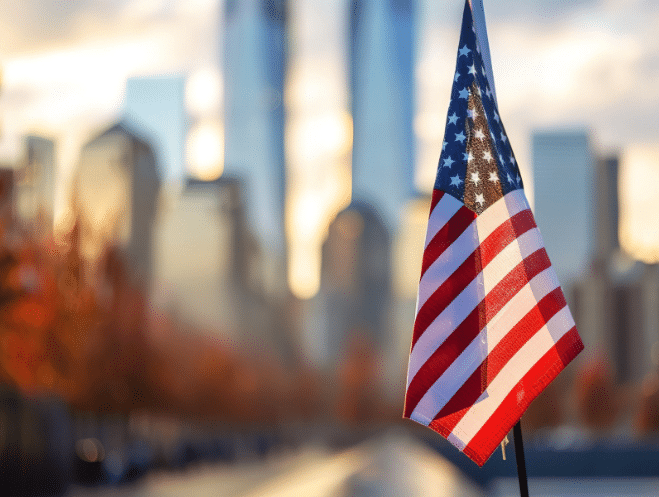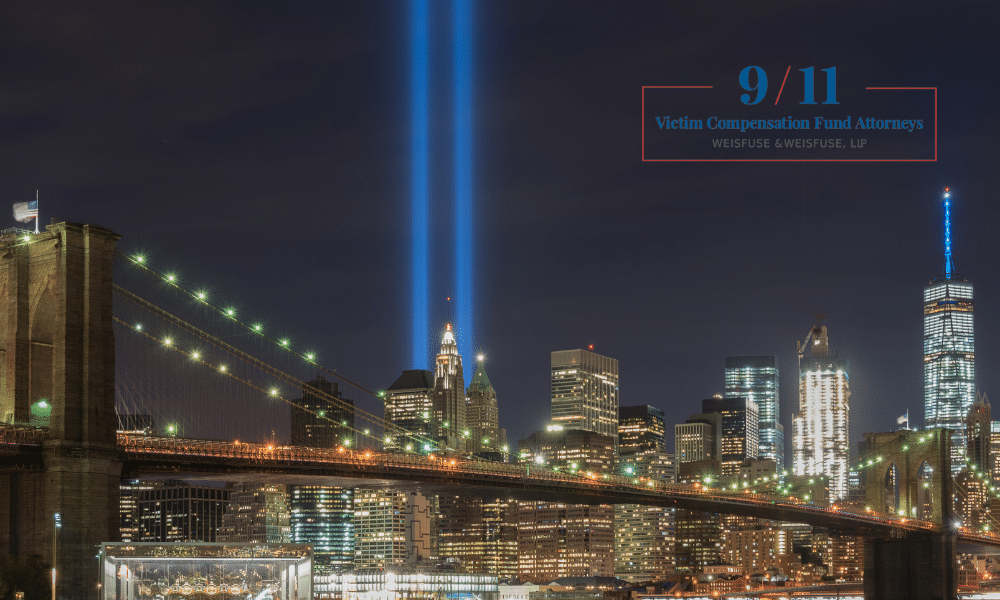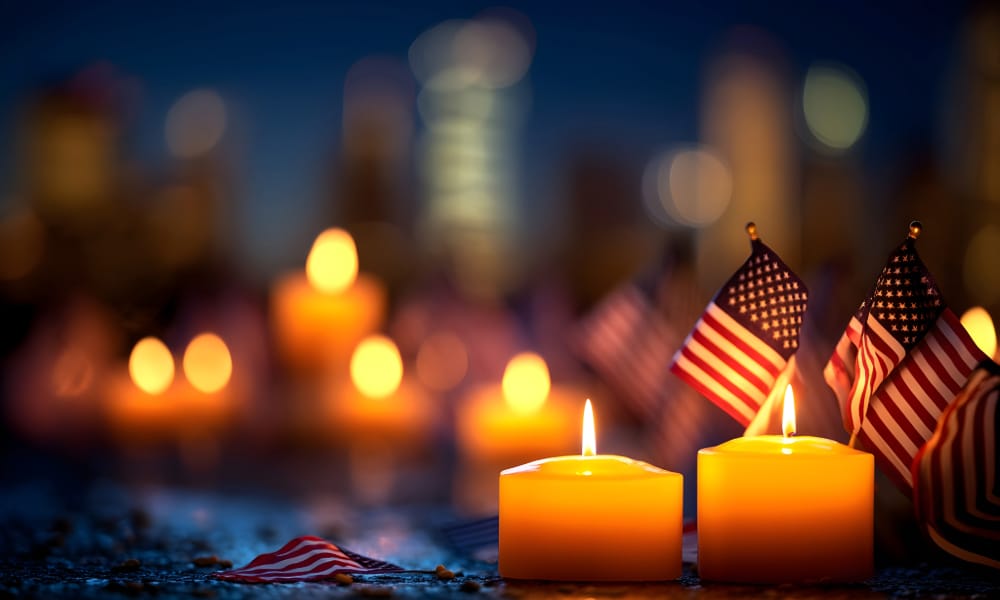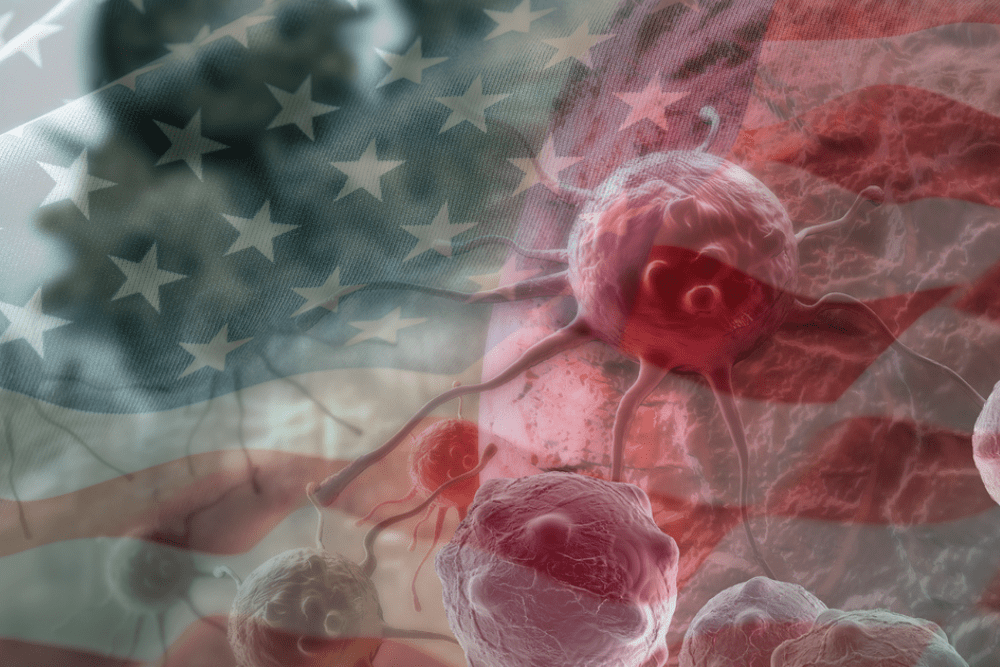
9/11 cancer attorneys
After the 9/11 attacks, thousands of responders, survivors, and downtown residents were exposed to a toxic cloud filled with known cancer-causing chemicals. Today, many of those individuals are being diagnosed with cancers directly linked to that exposure—including prostate cancer, skin cancer, thyroid cancer, and more.
The dust and debris released after the Twin Towers collapsed contained dangerous carcinogens such as asbestos, benzene, dioxins, polycyclic aromatic hydrocarbons (PAHs), lead, and mercury. As Dr. Michael Crane of the World Trade Center Health Program explained, “We will never know the composition of that cloud… but people were breathing and eating it. What we do know is that it had all kinds of god-awful things in it. Burning jet fuel. Plastics, metal, fiberglass, asbestos. It was thick, terrible stuff. A witch’s brew.”
Cancer claim benefits for 9/11 first responders & victims
If you were present in the exposure zone—whether as a first responder, cleanup worker, student, resident, or volunteer—between September 11, 2001, and May 30, 2002, and have since been diagnosed with cancer, you may qualify for medical treatment through the World Trade Center Health Program (WTCHP) and financial compensation through the September 11th Victim Compensation Fund (VCF).
At Weisfuse & Weisfuse, LLP, our experienced 9/11 cancer lawyers have helped thousands of clients secure the full benefits they deserve. We’ll guide you through every step of the 9/11 cancer claim process and fight to ensure your rights are fully protected.
Who Is at Risk for 9/11-Related Cancer?
First responders at Ground Zero experienced some of the most devastating long-term health effects from the 9/11 attacks—including significantly elevated cancer risks. But they’re not alone. Studies show that individuals who lived, worked, or attended school in Lower Manhattan after the attacks are also developing cancers at higher-than-normal rates.
According to clinical data:
- Prostate cancer risk increased by 25%
- Thyroid cancer risk surged by 219%
- Leukemia risk rose by 41%
Overall, responders are 30% more likely to develop cancer compared to others of the same age and demographic
But exposure wasn’t limited to first responders. Anyone who was in the designated exposure zone between September 11, 2001, and May 30, 2002—including residents, office workers, students, and cleanup volunteers—may now be eligible for critical medical and financial support.
Thanks to the James Zadroga 9/11 Health and Compensation Act, two major federal programs provide help to those affected:
- World Trade Center Health Program (WTCHP) – Offers free cancer screenings, treatment, mental health services, and ongoing medical monitoring for 9/11-related health conditions.
- September 11th Victim Compensation Fund (VCF) – Provides financial compensation for diagnosed physical conditions, lost income, medical expenses, and pain and suffering.
Patients enrolled in the WTC Health Program experience a 35% higher cancer survival rate compared to the national average—highlighting the importance of early detection and continuous monitoring.
What was in the 9/11 toxic dust cloud?
The toxic dust cloud that blanketed Lower Manhattan after the attacks was a dangerous mix of airborne chemicals, carcinogens, and microscopic debris. Confirmed contents included:
- Pulverized glass and cement dust
- Heavy metals (lead, mercury, arsenic)
- Up to 2,000 pounds of asbestos
- Synthetic vitreous fibers (SVFs)
- Persistent organic pollutants like dioxins and PCBs
- Polycyclic aromatic hydrocarbons (PAHs), a byproduct of jet fuel combustion
These substances lingered in the air for months. Fires smoldered well into December 2001, continuing to release new toxins long after the towers fell.
9/11 cancers covered by WTC Health Program
As responders flocked to Ground Zero to help with cleanup and survivors did what they were asked to do and returned to live, work, and study in the area south of Houston Street** in Lower Manhattan, they were not made aware of how many health risks they were exposing themselves to. Wall Street re-opened on September 17, 2001.
The following are just some of the 9/11 cancer types for which benefits are available from the Victim Compensation Fund:
Lung cancer and mesothelioma
Lung cancer and mesothelioma are particularly linked to asbestos exposure, with numbers rising every year.
Blood Cancer (Leukemia)
9/11 Survivors have a 41% higher chance of developing leukemia, a type of blood cancer, than the average U.S. citizen of the same age.
Prostate cancer
Aggressive versions of prostate cancer are far more common in responders than in other U.S. men of the same age.
Ovarian cancer
Prolonged exposure to toxic dust and chemicals at Ground Zero has been associated with a higher risk of ovarian cancer among those present in the 9/11 exposure zone, as these carcinogens can disrupt cellular health in reproductive organs.
Colon cancer
Colon cancer is often a secondary cancer that is triggered following a previous 9/11-related cancer diagnosis.
Thyroid cancer
Thyroid cancer is one of the most common types of cancer linked to exposure to Ground Zero toxins after 9/11—but survival rates are better than for many other cancers.
Skin cancer
Skin cancer is another common 9/11-related cancer (both melanoma and non-melanoma) that is usually treatable.
Brain cancer
Brain cancer can sometimes be linked to secondary tumors related to a previous 9/11-related cancer diagnosis.
Pancreatic cancer
Pancreatic cancer has been linked to prolonged exposure to the toxic dust and hazardous chemicals released in the 9/11 exposure zone, posing a significant risk to those present during and after the attacks.
Kidney cancer
Kidney cancer has been associated with exposure to the toxic dust and carcinogenic particles in the 9/11 disaster area, affecting many responders and survivors years after the attacks.
Uterine cancer
Exposure to hazardous chemicals and toxins in the 9/11 disaster area has been linked to an increased risk of uterine cancer among survivors and responders, with symptoms often emerging years after the attacks.
Bladder cancer
The toxic dust and chemical exposure from Ground Zero has been associated with a heightened risk of bladder cancer, affecting many who spent time in the 9/11 disaster zone.
Liver cancer
Anyone who lived, worked, or studied in Lower Manhattan after 9/11 and was later diagnosed with liver cancer may qualify for lifetime medical care and tax-free compensation through the September 11th Victim Compensation Fund.
Multiple myeloma
Exposure to the hazardous chemicals and carcinogens released at Ground Zero has been linked to an increased risk of multiple myeloma in 9/11 survivors and responders.
Digestive system cancer
Toxic exposure from the 9/11 attacks has been associated with a higher incidence of digestive system cancers among those who were in the affected areas, due to inhaling and ingesting harmful particles.
Eye & orbit cancer
Exposure to hazardous substances in the 9/11 disaster zone has been linked to increased cases of eye cancer, as toxic particles may have contributed to cellular damage in sensitive eye tissues.
Head and neck cancer
Head and neck cancers have been linked to 9/11 toxic exposure, as inhaling harmful particles and chemicals from the Ground Zero debris cloud has been shown to damage tissues in the respiratory and oral regions.
Soft tissue cancer (sarcoma)
Sarcoma has been associated with 9/11 exposure due to prolonged contact with hazardous substances in the Ground Zero area, which are known to increase the risk of rare cancers affecting connective tissues.
Mediastinal Cancers
Mediastinal cancer develops in the mediastinum, the central area of the chest housing the heart, lungs, esophagus, and lymph nodes. Exposure to toxic dust from 9/11 has been linked to this cancer in those present in the exposure zone on or after the attacks.
Childhood Cancers
Anyone who has childhood cancer, and was in the New York City Exposure Zone, should contact us immediately to discuss your 9/11 childhood cancer claim right away.
What Benefits Are Available for 9/11 Cancer Victims?
Individuals diagnosed with a 9/11-related cancer may be eligible for both free medical care and financial compensation through two federally administered programs created under the James Zadroga 9/11 Health and Compensation Act:
World Trade Center Health Program (WTCHP)
Since 2012, the WTCHP has provided no-cost medical treatment, cancer screenings, and prescription medications to those diagnosed with certified 9/11-related conditions.
- First responders receive full coverage, unless they also qualify for workers’ compensation.
- Survivors—including residents, office workers, and students in the exposure zone—receive the same benefits. However, the WTCHP acts as secondary coverage, paying costs not covered by their primary insurance (Medicare, Medicaid, or private plans).
- To access these benefits, individuals must seek care through approved WTCHP providers and pharmacies.
If you believe your cancer is linked to 9/11 exposure, getting screened as soon as possible can improve health outcomes and help confirm your eligibility for benefits.
September 11th Victim Compensation Fund (VCF)
The VCF offers tax-free monetary compensation to individuals diagnosed with 9/11-related cancers or illnesses. This includes:
- Lost income and reduced earning capacity
- Medical and out-of-pocket treatment costs
- Replacement of household services
- Pain and suffering damages
- Wrongful death and funeral expenses (for surviving family members)
Eligible individuals include not only first responders but also anyone who lived, worked, attended school, or volunteered in the exposure zone between September 11, 2001, and May 30, 2002.
Important Deadlines
- Most individuals had to register with the VCF by July 29, 2021, but you may still qualify.
- If you were diagnosed more recently, you generally have two years from the date you knew (or should have known) your condition was related to 9/11 exposure.
- The final deadline to submit a claim is October 1, 2090.
Past VCF payouts filed by our 9/11 cancer attorneys
As a September 11th Victim Compensation Fund lawyer, we were witness to the tragic events that unfolded on September 11, 2001. That gives us the additional passion and dedication to helping people who have been injured, made ill, or who have contracted cancer as a result of the terrorist attack on the World Trade Center.
Our track record of obtaining maximum VCF cancer payouts for our clients is a result of that commitment. This includes an award of $1,892,969.00 for a victim of pancreatic cancer linked to being present in the 9/11 exposure zone.
Contact our 9/11 Cancer Attorneys
Our 9/11 fund lawyers have the skill and experience needed to help victims get the medical care and financial compensation they need to move forward. To learn more about how we can help, please contact us online or call us directly at 212-983-3000 today to schedule a free consultation to discuss the specifics of your case.
** Numerous advertisements and media outlets are informing New Yorkers about their possible eligibility for 9/11 benefits if they were in Lower Manhattan during the attacks and suffer from health conditions due to toxic dust exposure. At Weisfuse & Weisfuse LLP, we emphasize that the “exposure zone” isn’t limited to Canal Street but can extend further to Houston Street.


